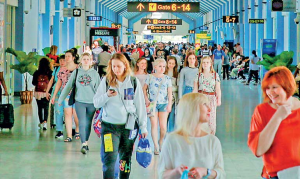- 4,020 tourists in first 4 days of Sept. push YTD arrivals to 500,472
- India, UK, Australia, Germany, Canada among top source markets
- SLTDA Chief Priantha Fernando confident of achieving 1 m arrivals
- Eyes $ 1.75 b earnings this year; $ 825 m netted so far in first 7 months

With the 4,020 travelers entered the country during the first four days of September 2022, Sri Lanka has exceeded the half-a-million mark of tourist arrivals.
As per provisional data released by the Sri Lanka Tourism Development Authority (SLTDA) yesterday, a total of 500,472 visitors have arrived so far.
During the first four days of September, India topped the tourist inflow with 844, followed by the UK with 490, Australia with 320, Germany with 278, and Canada with 230 travelers. In addition, travelers from Russia, Maldives, France, Spain, and the US were welcomed to Sri Lanka.
On 1st September, a total of 1,029 tourists, followed by 1,079 on 2nd September, 1,014 on 3rd September, and 920 on 4th September. The daily average number of arrivals is 1,011.
In August, arrivals fell by 20.2% to 37,760 from 47,293 in July, as a direct impact of the unfavorable travel advisories imposed by multiple countries against Sri Lanka.
Despite the multiple challenges, Sri Lanka’s tourism industry looks to be in high season, as they ramp up efforts to achieve the set target of one million arrivals and boost foreign exchange inflows to overcome the economic woes.
“Sri Lanka could achieve the set target of one million tourists, whilst earning over $ 1.75 billion by year-end,” SLTDA Chairman Priantha Fernando told the Daily FT expressing his confidence.
According to preliminary data from the Central Bank, tourism earnings in the first seven months totaled $824.9 million, up from $50.4 million in the same period the previous year.
In July, tourism earnings were estimated at $ 85.1 million, compared to $ 6.3 million in the same period a year earlier.
Sri Lanka lost over $ 10 billion in foreign exchange earnings, which generates over $ 4.3 billion annually, due to the pandemic during the past two years.
